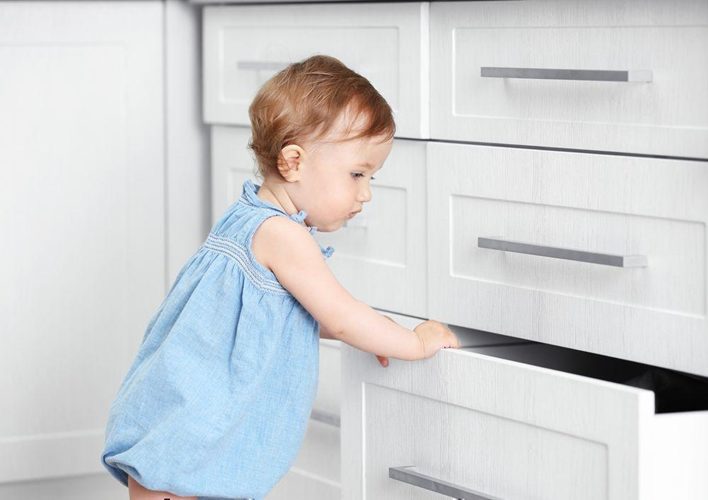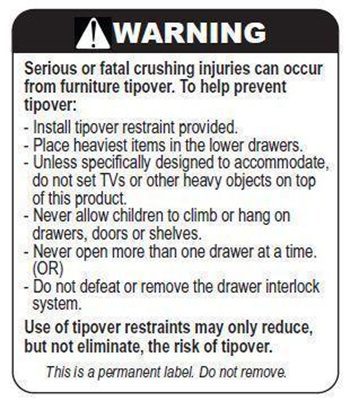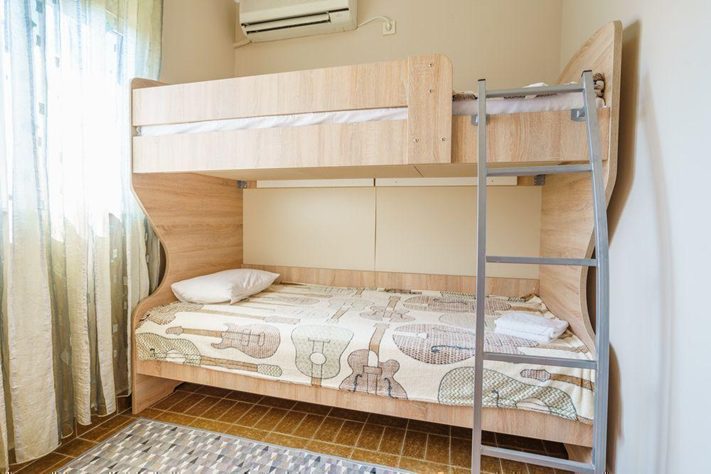Home Emergencies You Should Be Prepared To Handle
Peace of Mind at Home: 5 Emergencies You Can Handle with Preparation Most days at home are uneventful. But when the stove catches fire or pipes burst under the house, do you know what...
According to statistics, a child is killed every ten days by falling furniture and television sets. 91% of these accidents occur at home and the majority of the children involved are killed or significantly harmed with head injuries. There are a majority of consumer complaints about faulty furniture items that caused severe injuries to kids on different review websites, such as Yelp, BBB, PissedConsumer.com. We hope that this Safety Tips: Why You Need Child-Safe Furniture post inspires you.

Unsecured furniture presents a significant risk to children and making that furniture safer only requires educating parents, offering simple solutions, and helping parents follow through on anchoring furniture safely. Fortunately, organizations and websites are working hard to get the word out about safe furniture practices. Not all furniture needs to be safely secured. Some furniture is sturdy simply because it is closer to the ground or is too wide to tip over like beds and low entertainment centers. Taller furniture, however, can be extremely dangerous for children and parents must be aware of how to prevent furniture from tipping over.
Safety standards for furniture have been monitored by ASTM International since 2000. The safety standard related to furniture tip-over was updated in 2004, again in 2009 and most recently in 2014. ASTM F2057-14 is the Standard Safety Specification for Clothing Storage Units. This standard applies to dressers and chests of drawers, as well as other tall pieces of storage furniture more than 30 inches in height. To be compliant with the regulation, furniture manufacturers must meet three criteria.
To be considered compliant by ASTM International standards, a label must be permanently affixed to the furniture warning of furniture tip-over risk. Most furniture manufacturers concerned about meeting standards place this label inside a top drawer. The sticker should be visible while using the furniture.

To pass the ASTM Standards, furniture must pass two separate stability tests. Child-safe furniture must not tip over when all of the doors are opened and all of the drawers are pulled out. This test is performed while the furniture is empty. The second test for child-safe furniture involves adding weights to the front of the unit. A 50-pound weight is gradually added to the front of the drawers and the outer edge of the door. This weight simulates a climbing child, and to pass regulations, the empty dresser cannot tip under that added weight.
Finally, to meet the ASTM International standards, the furniture must include high-quality tip-over restraints. Not only should every piece of child-safe furniture be sold with a tip-over restraint, but the directions for installing those restraints should be included as well.
Of course, the furniture manufacturer can include the safety restraints and the instructions for using them, but if parents fail to install the tip-over restraints, their child is still in significant danger from tall pieces of furniture and televisions. Some parents recognize the problem with furniture immediately and prevent their children from accessing potentially dangerous areas. Two different PissedConsumer.com users bought bunk beds. One was a Pottery Barn Kids bunk bed, and the other was a Rooms to Go bed. In both cases, the new bunk beds were delivered and then assembled incorrectly.
The parents, in both situations, recognized that the beds were done incorrectly and called customer service to have the beds replaced or repaired. In both cases, customers were left waiting for customer service to pick up the beds at their leisure to resolve the issue. To date, there is no indication that either set of bunk beds has been picked up or repaired. The big name in dangerous furniture for children isn't Pottery Barn Kids or Rooms to Go. IKEA holds the prize thanks to a potentially botched recall on a tall dresser.
 Before 2015, seven children were killed by the Malm dresser. Despite this, no official recall was announced on the dresser for child safety purposes. Instead, in 2015, after the seventh child was tragically killed in an incident with the six-drawer dresser, the Consumer Product Safety Commission, CPSC, announced that IKEA was offering free wall anchoring kits. The notice about the free kits included a phrase about discontinuing the use of children's furniture greater than 23½ inches and adult furniture over 29½ inches without secure wall anchors.
Before 2015, seven children were killed by the Malm dresser. Despite this, no official recall was announced on the dresser for child safety purposes. Instead, in 2015, after the seventh child was tragically killed in an incident with the six-drawer dresser, the Consumer Product Safety Commission, CPSC, announced that IKEA was offering free wall anchoring kits. The notice about the free kits included a phrase about discontinuing the use of children's furniture greater than 23½ inches and adult furniture over 29½ inches without secure wall anchors.
It was not until 2016, that the term “recall” was used. Now, in 2017, an eighth child was killed by the dresser and IKEA is making a bigger push to alert customers about the recall and safety concerns with the Malm dresser. That doesn't mean the recall is going smoothly, however. One PissedConsumer user is frustrated by IKEA's follow-through when it relates to the recall. The store told customers that it would refund the cost of the Malm dresser and come to pick it up.
The PissedConsumer.com user posted that she set up a time for the store to collect the defective Ikea dresser, but that the delivery truck never arrived. When she called to follow up, she was unable to reach anyone on the phone. To date, there has been no indication that the situation has been resolved.
While IKEA works to make amends with customers to resolve the safety concerns of parents, you don't have to wait for a company to alert you to potential dangers around your home. The biggest culprits of furniture accidents in the home are chests of drawers and dressers taller than 30 inches and television sets. A television set falls with a force ten times greater than an NFL linebacker. Fortunately, preventing these accidents and anchoring furniture is simple and takes almost no investment of time or money. Follow these tips to improve the safety of your home and learn how to anchor furniture to a wall.
While it may be tempting to place a television on top of a tall dresser, this can lead to dangerous temptation and falls. Televisions should only be placed on furniture designed to hold the weight of a television stably and safely.
 Secure Televisions
Secure TelevisionsYou can (and should) take television safety another step and secure the television to the wall using a wall mount rather than placing the television on top of a dresser. If a wall mount is not an option, consider anchoring your flat-screen television to the anchors included in many entertainment centers.
Furniture in compliance with ASTM standards includes instructions on how to properly anchor furniture to a wall. The furniture should also come with a wall anchor kit or bracket. Follow the instructions that came with the furniture to secure the items safely.
While new furniture may come with wall anchors, older furniture may require additional purchases. Fortunately, you don't have to buy all new furniture to ensure your home is safe. You can buy additional wall anchors and brackets at local hardware stores and install them according to the instructions in the packet. Whether they are provided or purchased separately, be sure to install brackets right away to properly anchor furniture to a wall.
Finally, it is always wise to remove temptation. Televisions and game systems placed on top of tall dressers can be extremely tempting for young players. This can be true for other desirable items. Children have no qualms about using drawers and shelves as a ladder to reach what they desire, even older children. Storing tempting items behind locked doors or on furniture designed to safely hold them is always a safe bet.
Children are natural explorers. They love to climb and have adventures anywhere they can – and that includes every room of your home. Learning how to anchor furniture to the wall safely and securely is one of the most important steps to ensuring your home is an enjoyable and safe place for your whole family. We hope that this Safety Tips: Why You Need Child-Safe Furniture post inspires you. Good luck!
Comments are closed.
Nice post and great suggestion for kids.
Pingback: Making Sure Your Children Are Healthy Both Physically and Mentally